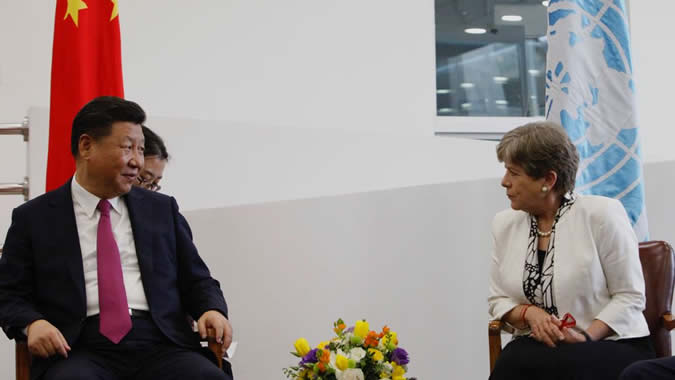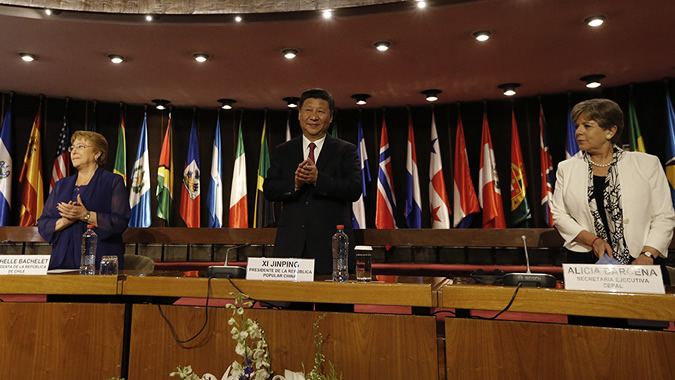“One Belt One Road” is a Civilizing Proposal of Interconnectedness and Shared Prosperity: ECLAC
Work area(s)
The organization’s Executive Secretary, Alicia Bárcena, indicated that Latin America and the Caribbean “cannot be left behind” during a high-level Forum held in Beijing.

“The countries of Latin America and the Caribbean have a historic opportunity to strengthen ties with China and the rest of the Asian economies, and the Belt and Road Forum for International Cooperation offers us a civilizing proposal of interconnectedness and shared prosperity,” Alicia Bárcena, ECLAC’s Executive Secretary, said in Beijing during the high-level meeting that took place in the Chinese capital on May 14-15.
Bárcena headed the delegation of the Economic Commission for Latin America and the Caribbean (ECLAC) at this international summit, attended by around 1,500 delegates from more than 130 nations, including the presidents of 28 countries, among them Argentine leader Mauricio Macri and Chilean President Michelle Bachelet, as well as the United Nations Secretary-General, Antonio Guterres.
The Forum was inaugurated on Sunday, May 14 by the President of China, Xi Jinping, who called for international cooperation not just with the countries of Africa, Central Asia and Europe, but also with the region of Latin America and the Caribbean. “It was a speech about a change of era. Xi made a very innovative proposal, with a panoramic perspective that combines the objectives of all countries,” Alicia Bárcena stated after the President’s speech.
In addition to the inauguration, ECLAC’s Executive Secretary participated in a thematic session about policy coordination and synergies in development strategies, where she spoke about the tensions of globalization in the current world and international context, which require a new development and governance pattern that comes from the south.
“The One Belt One Road initiative represents a renewal of, and a profound commitment to, the values that are fundamental for our global economic and social well-being: interconnectedness, deeper trade and investment ties, transparency and openness, and the need for economic growth to be coupled with social progress,” Bárcena said.
Alicia Bárcena recalled that China has been a strategic partner for the Latin American and Caribbean region, as demonstrated by the continuous efforts made by both parties and as manifested in China’s Policy Papers on Latin America and the Caribbean, published in 2008 and 2016; the free-trade agreements with Chile, Peru and Costa Rica; the creation of the CELAC-China Forum and the Cooperation Plan 2015-2019; and the numerous visits by Chinese authorities to the region, which have been aimed at reinforcing the Asian giant’s commitment to strengthening economic and cooperation ties.
Among these, President Xi Jinping’s visit last November to ECLAC’s central headquarters in Santiago, Chile stands out. On that occasion, the president reaffirmed the comprehensive strategic partnership between his country and Latin America and the Caribbean to foster their people’s development in current global circumstances.
According to ECLAC, the region has great opportunities for improving its economic relations and its cooperation with China. The organization notes that since the beginning of this century, the Asian country has become a leading trading partner for Latin America. Whereas in 2000 just 1% of regional exports were sent to China and 2% of imports came from there, in 2015 these figures had risen to 10% and 18%, respectively. China is already the first or second destination for exports from several South American countries, and it is one of the three top providers of imports for nearly all Latin American countries.
In addition, particularly since 2010 China has become a relevant foreign investor in the region – reaching its historical peak that year with around $14 billion dollars (equivalent to 11% of the total FDI received by the region in 2010) – and an important source of credit for some countries. Furthermore, under the CELAC-China Cooperation Plan, both parties expect to increase trade to $500 billion dollars and reciprocal direct investment to $250 billion dollars by 2025.
Bárcena also reaffirmed her support for the CELAC-China Forum, the next edition of which will be held in January 2018 in Chile, since it has been a very valuable space not just for defining strategic objectives in the bilateral relationship, but also for exploring cooperation and coordination on the big issues of global governance.
“At this forum a high-level political dialogue could be expected to address the challenges of the global agenda in an increasingly complex international context that includes greater protectionist and nationalistic tendencies in industrialized countries and the need to achieve the goals of the 2030 Agenda for Sustainable Development,” Alicia Bárcena indicated.
ECLAC’s Executive Secretary added that “At this critical juncture in human history, Latin America and the Caribbean simply cannot be left behind. And, as our friend and strategic partner, we look to China for support and guidance. There are already several cooperation plans in place, such as the 1+3+6 and 3x3 models, which seek to use the three engines of trade, investment and financial cooperation to boost development in several key industries such as energy and resources, infrastructure, construction, agriculture, manufacturing, scientific and technological innovation, and information technologies. These cooperation models also contemplate that our friendship will extend to managing international affairs and global governance.”
“I call on the nations of Latin America and the Caribbean to harness the potential that this initiative of One Belt One Road has for redefining capitalism through people’s equality and dignity,” Bárcena concluded.
During her visit to China, Alicia Bárcena also held bilateral meetings with senior officials from that country’s Foreign Ministry, as well as with administrators from the Beijing Normal University and the Chinese Academy of Social Sciences.
Related content

China’s President Reaffirms Strategic Partnership with Latin America and the Caribbean in Visit to ECLAC
Xi Jinping inaugurated the Summit of Leaders from the Media along with Chilean President Michelle Bachelet and ECLAC’s Executive Secretary, Alicia Bárcena.
Country(ies)
- China
- Latin America and the Caribbean
Contact
Public Information Unit
- prensa@cepal.org
- (56 2) 2210 2040
